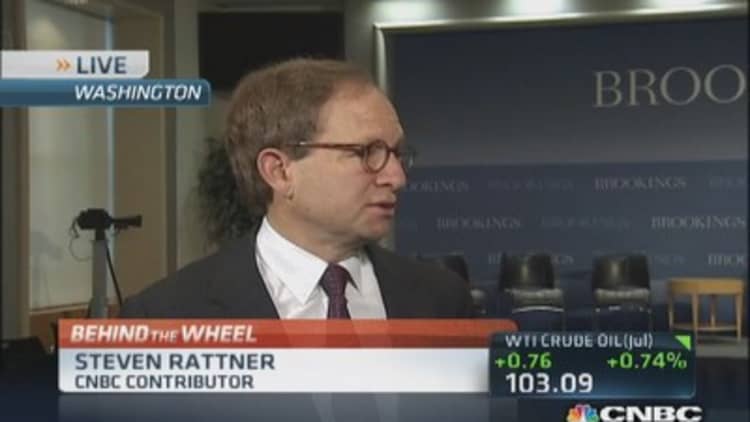In the latest sign Americans are increasingly comfortable taking on more debt, auto buyers borrowed a record amount in the first quarter with the average monthly payment climbing to an all-time high of $474.
Not only that, buyers also continued to spread payments out over a longer period of time, with 24.8 percent of auto loans now coming with payment terms between six and seven years according to a new report from Experian Automotive.
That's the highest percentage of 6 and 7-year loans Experian has ever recorded in a quarter.
Read MoreGoogle's driverless car can navigate a city
"I'm not surprised consumers are borrowing more or taking out longer auto loans," said Melinda Zabritski of Experian Automotive. "With relatively low interest rates, buyers are more comfortable taking out longer loans so they can keep their monthly payment as low as possible."
Experian, analyzed approximately 4.7 million new and used auto loans written between January and March.
Those loans totaled $100.7 billion, a record amount for auto loans written in any quarter in the U.S. The average length of auto loans increased by one month to five and half years, a new all-time high, it said.
Read MoreToo many recalls: Fiat Chrysler CEO
"Consumers are really relying on financing as the price of new vehicles continues to move higher," said Zabritski.
In the first quarter, the average auto loan jumped $964 to $27,612, an all-time high, according to Experian. Just five years ago, the average auto loan was $24,174.
Longer loans, owning cars longer
One reason almost one out of every four auto buyers took out a loan with repayment terms between six to seven years is because they're holding on to their vehicles longer.
Read MoreIgnition switches, parking fails: Recalled cars
IHS Automotive says the average American is holding on to their new vehicle for six years and one month. A decade ago, the average length of ownership was four years and two months.

"The days of buying a new car every three to five years are gone," says Mark Seng with IHS Automotive. "With vehicles lasting longer and having more technology, buyers are clearly willing to own their cars six or seven years, often longer."
The one risk for buyers taking out seven-year auto loans is the chance they'll be "upside down" and owe more than their vehicle is worth if they try to sell it before the loan is paid off.
Read MoreAnother GM recall: 218K Chevy Aveos for fire risk
"With a seven-year loan, you really need to pay off at least five or five and half years to avoid having negative equity with the vehicle," says Zabritski.
Leasing taking off
As new vehicle prices have edged higher, a growing number of consumers have decided to not take out an auto loan with an average monthly payment of almost $500. Instead, they are leasing vehicles and locking in lower monthly payments for three or four years.
"Our leasing business is up 20 percent this month," said Dave Fisher, Chairman and CEO of the Suburban Dealership Group in the Detroit metropolitan area. "People are turning to leasing because it makes more sense than taking out a loan, especially for premium models."
Read MoreThe corporate culture: Behind the scenes at General Motors
Even for mass market models, the difference in the average monthly payments for those leasing and buying a new vehicle is substantial.
Take the Honda Civic.
The average monthly payment for those buying was $347 in the first quarter, according to Experian. By comparison, the average monthly payment last quarter was almost $100 lower for those leasing, at $251.
"On average, leasing is about $100 less every month and that's one reason leasing has become more popular," says Zabritski.
Questions? Comments? BehindTheWheel@cnbc.com.


